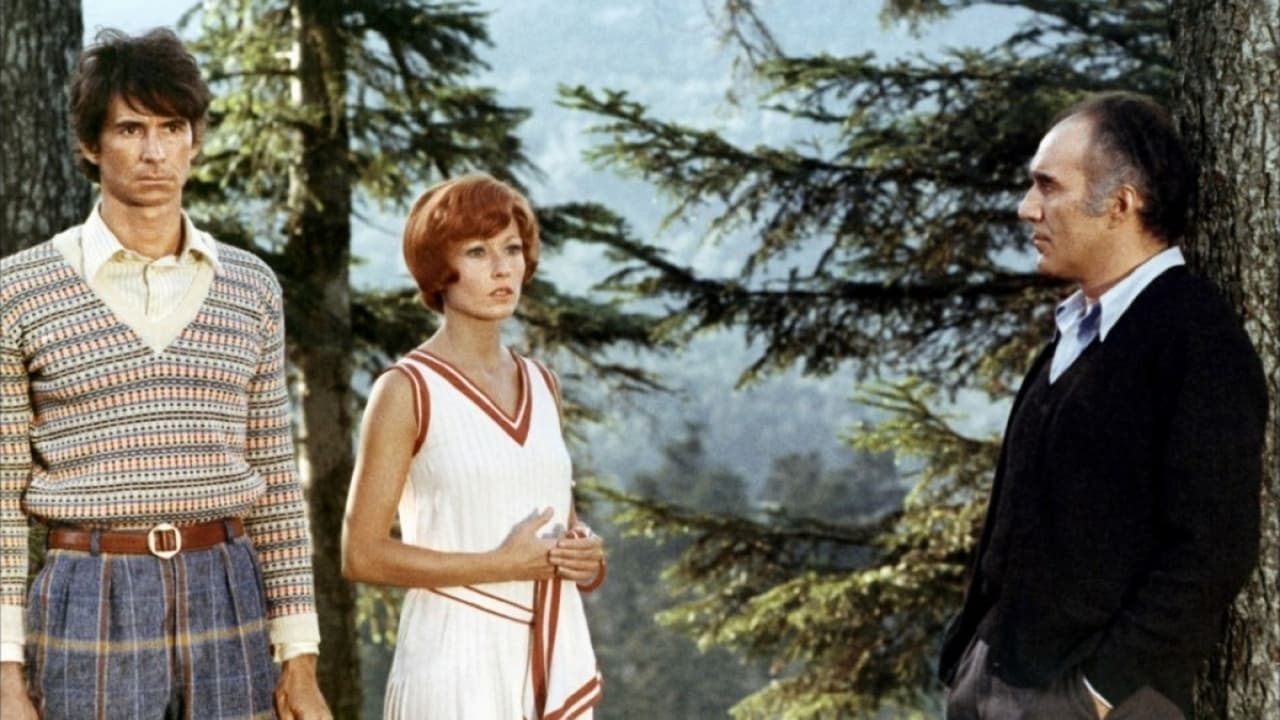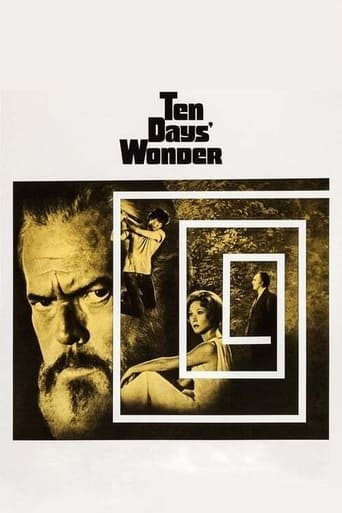

Self-important, over-dramatic, uninspired.
... View MoreAdmirable film.
... View MoreLet me be very fair here, this is not the best movie in my opinion. But, this movie is fun, it has purpose and is very enjoyable to watch.
... View MoreBy the time the dramatic fireworks start popping off, each one feels earned.
... View MoreThe tormented and unstable young sculptor Charles Van Horn (Anthony Perkins) summons his old family friend Paul Regis (Michel Piccoli) in Paris and tells him that he has weird nightmares followed by amnesia, and last time he had awaked with his hands full of blood. Paul and Charles travel to the countryside to the manor of Charles' stepfather, the millionaire Théo Van Horn (Orson Welles) that is married with the young Hélène Van Horn (Marlène Jobert). Paul is welcomed by the family and along the days, he learns that Charles and Hélène had a love affair and Charles wrote love letters to Hélène. One day, Théo gave a party for two hundred people and the letters were stole. Now they are blackmailed by the thief that demands a large amount to return the letters and Paul helps Hélène to pay the blackmailer. When the extortionist requests more money, Charles and Hélène forge a burglary, but the plan does not work well ending in a tragedy."La Décade Prodigieuse" a.k.a. "Ten Days' Wonder" is a slow-paced dramatic thriller by Claude Chabrol. The story based on the Ten Commandments is very well acted but unfortunately it is not difficult to foresee the twist since the number of characters is only five. This DVD has not been released in Brazil and I have just watched a DVD from Pathfinder Home Entertainment. Unfortunately there are no subtitles and in some moments it is very difficult for a non-native in English understand the pronunciation of Orson Welles. My vote is eight.Title (Brazil): Not Available
... View MoreThis is a mildly interesting film that features two famous American actors (Welles and Perkins) along with a French/Italian cast. For some odd reason, the DVD I watched from Pathfinder Home Entertainment did not have working subtitles--the feature was on the DVD but no subtitles appeared. But, considering the film was done in English, it didn't matter.Anthony Perkins plays completely against type. In this movie, he is at times mentally imbalanced,....oh, wait,...that's pretty much what he seems to play in MOST of his movies. Well, at least this time, the hysterical performance by Perkins is described as being the result of being fed drugs by his adopted father.Orsen Welles plays a manipulative fat old rich guy. And I had no particular complaints about his acting. However, one odd little thing bothered me. During the first portion of the movie in particular, his makeup appeared to be all over his face EXCEPT around the nose--which was an obviously different, brownish kind of color--like he had a fake nose or it was necrotic or something. This did not play into the plot at all and I assume it was just the result of bad makeup. Or, maybe he was inspired by the character from CANDIDE, Dr. Pangloss.Marlène Jobert plays Welles' incredibly young wife. She seemed okay in the part.Michel Piccoli played the guy pulled into the middle of this weird family affair (in more ways than one) and probably came off the best for his acting.The plot is a weird twist on breaking the 10 Commandments. Over the course of the film, Perkins is manipulated into breaking all 10 by his nutty adoptive father. This reminded me very much of a contemporary film with a similar plot--THE ABOMNIBLE DR. PHIBES. However, despite PHIBES being a silly horror flick, I think I enjoyed watching it a lot more than this Chabrol film. The film, while not bad, is very difficult to believe and the acting, at times, is a bit over-the-top--especially from Perkins. You could do worse than watch the film but when there are so many better French films, why not watch them first?
... View MoreThis so called "thriller" did none of the above, mainly it only made me insensitive to the terrible acting portrayed in the film. About one hour is wasted by the director in presenting incomprehensible scenes from a spoiled and wealthy family. Hopkins is terrible here, playing an annoying rich junkie who doesn't know if he has killed someone or not. The others are squandered away in unmoving, flat dialogue and the end does not surprise anyone at all with its proclamation. Slow and tepid also....
... View MoreOne of the great anti-detective films of the 60s and 70s (such as THE SPIDER'S STRATEGEM, BLOW-UP, THE PARALLAX VIEW) in which the traditional, detached, problem-solving power of the detective is removed and he finds himself lost in a labyrinth. The detective here, Paul Regis, is so much the embodiment of reason that he is a professor of philosophy. He observes, analyses, seeks patterns in a bewildering maze - his genius results in the suicidal death of the wrongfully suspected hero.The film opens as a young sculptor, Charles Van Horn (Anthony Perkins), wakes up, hands bloodied, mind disoriented, thinking of ocean-deep life, in a hotel. He has no idea how he got there, and Chabrol visualises his disturbed mind with extreme tilted angles and harrowing electronic music. He calls the only person he knows in the area, an old lecturer of his, Paul Regis (Michel Piccoli), and asks him to visit his home, a vast provincial mansion presided over by his bulky, Americanised father Theo, played with a lovely mixture of melancholy and play by Orson Welles, and his pretty young wife, Helene (Marlene Jobert).Beneath the bourgeois facade, Paul finds an almost Gothic seething of adultery, power games, mad old ladies, blackmail, theft, Oedipal trauma. Charles and Helene have begun an illicit relationship, and are being blackmailed. Charles steals the money from Theo, and both parties enlist Paul to spy on the other. Paul finds his detachment, however, increasingly compromised, and in the climactic 'revelation' scene, all fingers point at him.This film is based on an Ellery Queen novel, exemplar of all that is lucid and simplistic about the detective genre, in which complex plotting is always framed in such a way as to be accessible to the reader, so he can have a go at playing detective himself. They follow the usual formulae: crime-investigation-solution; disruption-reassertion of order.Chabrol's film is Ellery Queen written by Borges. It subverts every tenet of the genre in a myriad of ways. Although the traditional crime film is deliberately artificial, it depends on a surface realism (plausible settings and outwardly recognisable characters) to succeed. Chabrol foregrounds his material's gleeful playfulness at every turn. The viewer is never allowed to lose himself in the plot; the elaborate, disruptive camera movements; the intrusion of decor into the plot; the wild playing with time and point of view; the 'amateurish', unrealistic acting and stilted dialogue; the wayward plotting all point up the artifice and unbelievability of the film, the sense of a godlike puppetmaster pulling strings. This sense is crucial to the story, when the narrative puppetmaster (Theo) is linked directly to the camera, i.e. the director (Theo's wife bears a remarkable resemblance to Chabrol's wife, Stephane Audran).This foregrounding of artifice reverberates throughout the film, which creates an opposition between creators (Theo, Charles) and interpreters (Paul). This is linked to the traditional crime story - someone 'creates' a crime that must be interpreted by the detective. This kind of pattern, however, suggests a social order in which reality can be known, ordered and controlled. Chabrol suggests that this is not the case. He shows the unknowability in many ways. The film is set in a rarefied space away from the 'real' world, which is also a fantasy set where Theo plays out his dreams of 20s grandeur. Much of the plot is related by characters whose reliability is seriously in doubt from the start. WONDER starts with Charles emerging from a dream, and the film never loses this sense of the oneiric. Scenes repeat themselves as characters are lost in a maze, literally so, with all the repeated corridors and stairs in the film, the profusion of mirrors and windows that reflect back or multiply meanings, the decor that constantly dwarfs the characters.WONDER is about play, but also quotes from a famous play, Oedipus Rex, which is among other things the first detective story. Charles sleeps with his mother, Helene, and tries to destroy his father. This founding human myth is countered by the father with Christian patterning (in a way that foreshadows SEVEN); both cancel each other out, one is left with neither catharsis nor redemption. But Oedipus was both detective and criminal, andso is Paul (Theo says he is guiltier than him). Images of sight and blindness pervade the film (linked in a very real way to the cinema), and the final 'revelation' is lit by a lamp half Atlas, half eye. But the detective is truly blind, trying like Holmes to fix patterns in the abyss, revealing that abyss as he fails to do so, carelessly costing lives. There is, ironically, no death, UNTIL the detective makes his judgement, rather than the other way round.The film is also a brilliant family saga, the country house a site for all manner of generational psychodramas (the paedophiliac implications of Theo's and Helene's marriage are chilling). But there are Oedipal struggles too, and the apparent artifice masks a very personal Chabrol film. His casting is very deliberate, with Welles playing a self-destructive KANE figure, playing God through kindness; Perkins invoking both PSYCHO (and the Hitch suggestions are both brilliantly misleading (we're all looking at the mother!) and enriching (the 'innocent' wrongfully accused; the Catholic depths; the famed concept of transferring guilt), and the (Welles-directed) THE TRIAL; Piccoli (veteran of bourgeois bashers Bunuel and Godard, as well as a link, through LE MEPRIS, to Chabrol hero Lang).The film is remarkably perspicacious about class and money (the 'God' figure is a poor Frenchman who made his fortune in America) - and the country house is used in its double metaphor for both the state at large and the mind. Amid all the sterile, despairing , destructive, man-made constructs, Chabrol has never lost his beautiful sympathy with the French countryside. This is one of a series of stunning thrillers made by Chabrol in the late 60s/early 70s that blow apart the conservatism of the genre.
... View More